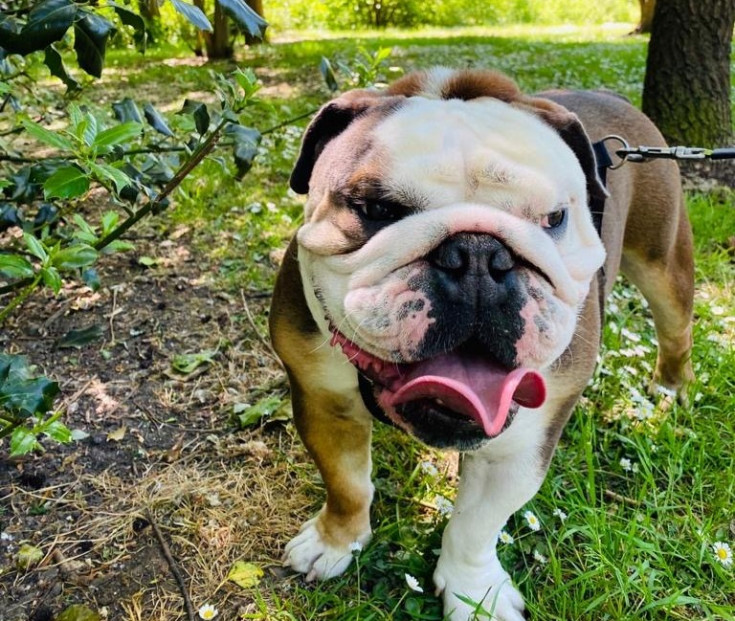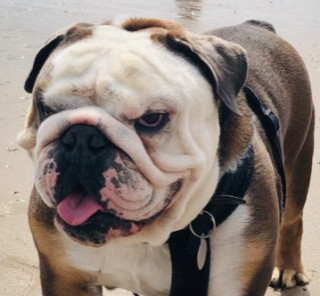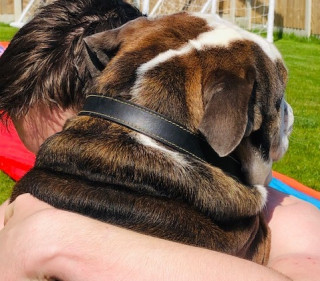We're here to help

Owner urges 'brachycephalic' pet owners to keep a close eye on their health
An English bulldog nearly died after developing critical breathing problems during a gentle walk.
Now owner Adam Grater is warning others to watch for potentially lethal warning signs, even when the weather isn’t warm.
And, with beloved pet Dozer only saved by the swift action of our team at Vets Now in Hull, he’s urging owners to get immediate help if they suspect trouble.
There has been a massive boom in flat-faced dogs, known as brachycephalic breeds, with ownership rocketing by more than 3000% in little over a decade.
But the breeds are susceptible to several health issues, including Brachycephalic Obstructive Airway Syndrome, BOAS, due to a narrowing of the upper respiratory tract.

You might also be interested in:
Adam, 41, and his wife had previously had Jack Russell terriers but had chosen two-year-old Dozer for his placid nature around their two young children.
“We had heard all the stories about potential breathing problems, but we knew we weren’t going to have the kids running him off his feet,” said Adam.
“He plays with them but he’s very docile and loveable.”
Dozer had been out for a walk close by the family home near Hull when he suddenly became unwell.
“We are very careful about walking him and we always take two or three bottles of water with us,” said Adam. “It was probably even a shorter walk than normal and it was quite a mild day, certainly no heatwave, and this was out of the blue and totally unexpected.
“Even though we were in the shade a lot, he was breathing very heavily and kept having to sit down.
“At first it seemed just like a normal panting by a dog but then I could see he was increasingly struggling to breathe. I thought I could see his colour changing and it was really worrying and I didn’t want to take any chances.”
As it was the evening and his own vet was closed, Adam immediately called Vets Now and then rushed Dozer to the clinic in Hull.
It’s one of nationwide chain of clinics and hospitals open 24 hours a day, seven days a week for pet emergencies.
It took several hours of skilful work by the team to pull Dozer back from the brink of death.
“Everyone at Vets Now did their best and they kept us really well informed,” said Adam.
“It was overnight and obviously we didn’t sleep as we were waiting for word. When they told me he had pulled through and had made a good recovery it was such a relief.
“We just couldn’t understand how this had happened.”
On Vets Now’s recommendation, Adam took Dozer to his vet for further checks and subsequently decided to get Dozer an operation to improve his breathing.
“If you see that your pet is starting to breathe differently or erratically, or their colour starts to change, then you’ve got to get them to the vet very quickly,” added Adam.

Susana Jauregui, senior vet at Vets Now in Hull, treated Dozer on the night he was rushed in.
She said while he wasn’t suffering from heat stroke, he was struggling to breathe, which is common in many brachycephalic dogs.
Susana explained: “Dozer was very unstable when he was brought in and his blood pressure was dropping alarmingly. We gave him rapid intravenous fluids to try to help but it wasn’t looking good.
“When we tried to get him back to the kennel, he went downhill really fast and we had to carry him back to the treatment room and get him back on oxygen.
“After four hours of one-to-one monitoring we removed the tube and connected a nasal catheter to the oxygen, and he started to become progressively more stable. He fought all night long to survive and was remarkably well the next morning.
“It was such a relief for everyone involved and we’re so pleased to hear he’s better now.”

Our own specialists are seeing an increasing number of “brachycephalic” breeds being referred for corrective treatment and are calling on prospective pet owners to do their research before buying the highly fashionable pets.
If untreated, any dog with a shortened muzzle can suffer agonising health problems such as eye ulcers, heat stroke and breathing difficulties.
The Vets Now clinic in Hull – where Dozer received treatment – is one of a nationwide network of Vets Now clinics and pet emergency hospitals that are open through the night, seven-days-a-week, and day and night on weekends and bank holidays, to treat any pet emergencies that may occur.
All of Vets Now’s out-of-hours clinics and 24/7 hospitals have a vet and vet nurse on site at all times.
Vets Now has also recently launched an online video consultation service to make professional veterinary advice more easily available. While life-threatening conditions like Dozer’s would not be suitable for the service, their experienced vets are available to discuss any worries or concerns pet owners might have. If a pet needs to be treated at Vets Now, pet owners are refunded the online consultation fee.
